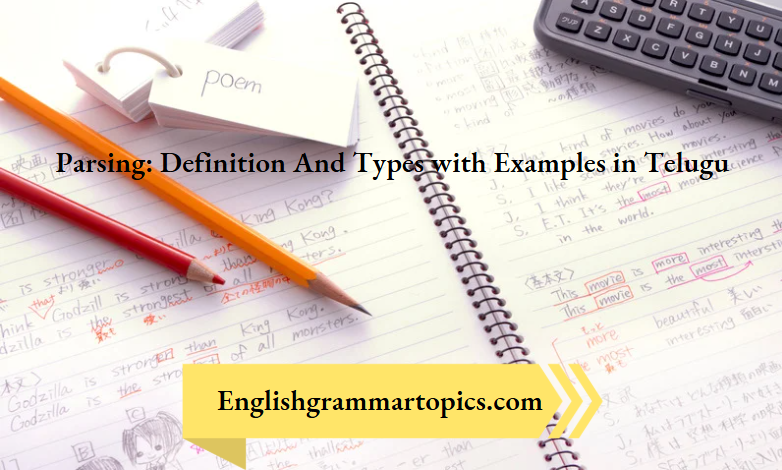అధ్యాయము 28
The Formation Of Words
233. తమ ఉనికికి ఇతర పదములతో సంబంధము లేని పదములను Primary Words (ప్రధాన పదములు) అని అంటారు. అవి ప్రప్రధమంగా భాషతో పాటు పుట్టినట్టివి.
1) Compound words : రెండుగాని అంతకంటే ఎక్కువగాని పదములతో కలిసి ఉండి, ఒకే అర్ధమును ఇచ్చు పదములను Compound పదములు అని అంటారు. (సంయుక్త పదములు)
Moonlight, nevertheless, undertake, man-of-war.
2) Primary Derivatives : Simple words ను కొద్ది మార్పులు చేయుట వలన తయారైన పదములను Primary Derivatives అని అంటారు.
Bond from bind, breach from break, wrong from wring.
గమనిక (Note) : Primary Verbs యొక్క Past Tenses అంతర్గతమైన (internal) మార్పుల ద్వారా form అగును. వీనిని Derivatives అని అనరు.
3) ప్రారంభమున గాని, అంతిమమునగాని ఒక పదమునకు ఏదైనా కలిపితే దానిని Secondary
Derivatives అని అంటారు.
Unhappy; goodness.
ఒక పదమునకు ముందు భాగములో కలిపిన పదభాగమును Prefix అని అంటారు. అదే చివర భాగములో కలిపితే దానిని Suffix అని అంటారు.
Read and Learn More Correct usage of grammar
(1) Compound Words
234. చాలా వరకు Compound words అనగా Nouns గాని Adjectives గాని Verbs గాని అయిఉండును.
235. Compound words ఈ క్రింది విధము form అగును:-
(1) Noun + Noun;
bationmao do
Moonlight, chess-board, armchair, postman, railway, airman, manservant, fire-escape, jailbird, horsepower, shoemaker, ringleader, screwdriver, tax-payer, teaspoon, haystack, windmill.
(2) Adjective + Noun;
Sweetheart, nobleman, shorthand, blackboard, quicksilver, stronghold, halfpenny.
(3) Verb + Noun;
Spendthrift, makeshift, breakfast, telltale, pickpocket, cut-throat, cutpurse, daredevil, scarecrow, hangman.
(4) Gerund + Noun;
Drawing-room, writing-desk, looking-glass, walking-stick, blotting paper, stepping-stone, spelling-
book.
(5) Adverb (or Preposition) + Noun;
Outlaw, after thought, forethought, foresight, overcoat, downfall, afternoon, bypass, inmate, off-shoot, inside.
6) Verb + Adverb;
Drawback, lock-up, go-between, die-hard, send-off.
(7) Aqverb + Verb; as,
Outset, upkeep, outcry, income, outcome.

236. Compound Adjectives ఈ క్రింది విధముగా form అగును. (రూపొందును):-
(1) Noun+Adjective (or Participle) + Adjective
Blood-red, sky-blue, snow-white, pitch-dark, breast-high, skin-deep, purse-proud, lifelong, world- wide, headstrong, homesick, stone-blind, seasick, note-worthy, heart-rending, ear-piercing, time- serving, moth-eaten, heart-broken, bed-ridden, hand-made, sea-girl, love-iorn.
(2) Adjective + Adjective;
Red-hot, blue-black, white-hot, dull-grey, lukewarm
(3) Adverb + Participle;
Long-suffering, everlasting, never-ending, thorough-bred, well-deserved, outspoken, down-hearted, far-seen, inborn.
237. Compound Verbs (808 360m rod.
(1) Noun+Verb;
Waylay, backbite, typewrite, browbeat, earmark.
(2) Adjective+Verb;
Safeguard, whitewash, fulfil.
(3) Adverb+Verb;
Overthrow, overtake, foretell; undertake.u,ndergo, overhear, overdo, outbid, outdo, upset, ill-use. గమనిక (Note): చాలా వరకు compound పదములలో మొదటి పదము రెండవ పదము యొక్క భావమును అజమాయిషీ (govern) చేయును. ఉచ్ఛారణ విషయంలో కూడా మొదటి పదమునకే ప్రాధాన్యత ఉంటుంది. Compound పదములోని రెండు పదములు కొంతవరకే కలిసిపోయి వాని వ్యక్తిత్వము (separateness) ఇంకా మిగిలిఉంటే, అ రెండు పదముల మధ్య hyphen (-) ఉంచవలయును. అటువంటప్పుడు రెండు పదములను సమానముగా ఉచ్ఛరించవలయును.
అభ్యాసము 123
ఈ క్రింది compound పదముల యొక్క కలయికను (formation) వివరించండి :-
Newspaper, football, moonstruck, turncoat, brand-new, jet-black, onlooker, soothsayer, stronghold, ice-cold, worldly-wise, tempest-tossed, race-horse, ear-ring, cooking-stove, over-dose, fire-proof, top-heavy, heaven-born, skin-deep, widespread, snake-charmer, lifelong, upland.
238. (2) Primary Deravatives
Verbs మరియు Adjectives నుండి రూపొందిచబడిన Nouns.
| Verbs | Nouns | Verbs | Nouns |
| Advise | advice | Gape | gap |
| Bear | bier | Gird | girth |
| Bind | bond | Grieve | grief |
| Bless | bliss | Live | life |
| Break | breach | Lose | loss |
| Burn | brand | Prove | proof |
| Choose | choice | Sing | song |
| Chop | chip | Sit | seat |
| Deal | dole | Speak | speech |
| Deem | doom, ditch | Strike | stroke |
| Dig | dike | Strive | strife |
| Float | fleet | Wake | watch |
| | Weave | web, woof |
| Adjectives | Nouns |
| Dull | dolt |
| Hot | heat |
| Proud | pride |
2) Verbs మరియు Nouns నుండి Adjectives ను రూపొందించుట
| Verbs | Adjectives | Nouns | Adjectives |
| Float | fleet | Milk | Milch |
| Lie | low | Wit | wise |
3) Nouns మరియు Adjectives నుండి Verbs ను రూపొందించుట
| Nouns | Verbs | Nouns | Verbs |
| Bath | bathe | Gold | gild |
| Belief | Believe | Grass | graze |
| Blood | bleed | Half | halve |
| Breath | breathe | Knot | knit |
| Brood | breed | Price | prize |
| Cloth | clothe | Sale | sell |
| Drop | drip | Sooth | soothe |
| Food | feed | Tale | tell |
| Glass | glaze | Thief | thieve |
| | Wreath | wreathe |
| Adjectives | Verbs |
| Coo! | chill |
| Hale | heal |
239. (3) Secondary Derivative
English Prefixes
A -, on, in; abed, aboard, ashore, ajar, asleep.
A out, from, arise, awake, alight.
Be-, by (sometimes intensive); beside, betimes, besmear, bedaub.
For-, thoroughly; forbear, forgive.
Fore-, before; forecast, foretell.
Gain-, against; gainsay.
In-,in; income, inland, inlay.
Mis-, wrong, wrongly; misdeed, mislead, misjudge.
Over-, above, beyond; overflow, overcharge.
To-, this; to-day, to-night, to-morrow.
Un-, not; untrue, unkind, unholy.
Un-, to reverse an action; untie, undo, unfold.
Under-, beneath, below; undersell, undercharge, undergo, underground. With-, against, back; withdraw, withhold, withstand.
Latin Prefixes
Ab, (a, abs), from, away, abuse, avert, abstract.
Ad (ac, af, ag, al, an, ap, ar, as, at, a), to; adjoin, accord, affect, aggrieve, allege, announce,
appoint, arrest, assign, attach, avail.
Ambi (amb, am), on both sides, around, ambiguous, ambition, amputate.
Ante (anti, an), before; antedate, anticipate, ancestor.
Bene, well, benediction, benefit.
Bis, (bi, bin), twice, two; biscuit, bisect, binoculars.
Circum (circu), around, circumnavigate, circumference,circuit:
Can (col, com, cor), with, together, contend, collect, combine, correct.
Contra (counter), against, contradict, counteract, counterfeit.
De, down, descend, dethrone, depose.
Dis, (dif, dl), apart, disjoin, differ, divide.
Demi, half, demigod.
Ex (ef, e), out of, extract, effect.
Extra, beyond, outside, of, extraordinary, extravagant.
In (il, im, ir, en, em), in, into; invade, illustrate; immerse, irrigate, enact, embrace.
In (II, im, ir), not; insecure, illegal, imprudent, irregular.
Inter (Intra, enter), among, within; intervene, introduce, entertain.
Male (mal), ill, badly, malevolent, malcontent.
Non, not, nonsense.
Ob (oc, of), in the way of against, object, occupy, offend.
Pen, almost, penultimate, peninsula.
Per (pel), through; pervade, pellucid.
Post, after, postscript, postdate, postpone.
Pre, before, prefix, prevent, predict.
Preter, beyond, preternatural.
Pro (por, pur), for, pronoun, portray, pursue.
Re, back, again, reclaim, refund, renew, return.
Retro, backwards; retrospect, retrograde.
Se (sed); apart, secede, separate, seduce, sedition.
Semi, half, semicircle, semicolon.
Sine, without, sinecure.
Sub (sue, suf, sug, sum, sup, sur, sus), under, subdue, succeed, suffer, suggest, summon, support, surmount, sustain.
Subter, beneath, subterfuge.
Super, above; superfine, superfluous.
Trans (tra, tres), across, transmit, traverse, trespass.
Vice, in the place of; viceroy, vice-president.
Greek Prefixes
A (an), without, not; atheist, apathy, anarchy.
Amphi, around, on both sides; amphitheatre, amphibious.
Ana, up, back, anachronism, analysis. Anti (ant), against, antipathy, antagonist. Apo (ap) from, apostate, apology.
Arch (archi) chief, archbishop, archangel, architect. Auto, self, autocrat, autobiography, autograph.A0
Cata, down, cataract, catastrophe, catalogue.
Di, twice, dilemma.
Dia, through; diagonal, diameter.
Dys, badly, dyspepsia, dysentery.
En (em), in, encyclopp,edia, emblem.
Epi, upon; epilogue, epitaph.
Eu, well, eulogy, euphony, eugenics.
Ex (ec), out of; exodus, eccentric.
Hemi, half, hemisphere.
Homo (hom), like; homogeneous, homonym.
Hyper, over, beyond, hyperbole, hypercritical.
Hypo, under, hypothesis, hypocrite.
Meta (met), implying change; metaphor, metonymy.
Mono, alone, single, monoplane, monopoly.
Pan, all, panacea, panorama,..pantheism.
Para, beside, by the side of, parallel, paradox, parasite.
Peri, round, period, perimeter, periscope. VGA RO
Philo (Phil), love, philosophy, philanthropy.
Pro, before, prophesy, programme.
Syn, (sym, syl, sy), with, together, synonym, sympathy, syllable, system.
English Suffixes
Of Nouns
(1) Denoting agent or doer
-er (-ar, -or, -yer); painter, baker, beggar, sailor, lawyer.
-ster; spinster, punster, songster.
-ter (-ther); daughter, father.
(2) Denoting state, action, condition, being, etc.
-dom; freedom, martyrdom, wisdom.
-hood (-head); manhood, childhood, godhead.
-lock (-ledge); wedlock, knowledge. JO0 -ness; darkness, boldness, goodness, sweetness.
-red; kindred, hatred.
-ship; hardship, friendship, lordship.
-th; health, stealth, growth.
(3) Forming Diminutives:
-el (-le); satchel, kernel, girdle; handle.
-en; maiden, kitten, chicken.
-le; dearie, birdie, lassie.
-kin; lambkin, napkin.
-let; leaflet.
-ling: duckling, darling, stripling, weakling.
-ock; hillock, bullock.
Of Adjectives
-ed, having, gifted, talented, wretched, learned.
-en, made of, wooden, golden, woollen, earthen.
-ful, full of, hopeful, fruitful, joyful.
-ish, somewhat like, boorish, reddish, girlish.
-less, free from, without, fearless, shameless, hopeless, senseless, boundless. -ly, like manly, godly, sprightly.
-some, with the quality of; wholesome, meddlesome, gladsome, quarrelsome.
– ward, inclining to; forward, wayward.
-y, with the quality of; wealthy, healthy, windy, slimy, greedy, needy, thirsty, dirty.
Of Verbs
-en, causative, forming transitive verbs; weaken, sweeten, gladden, deaden, strengthen.
-se, to make, cleanse, rinse.
-er, intensive or frequentative: chatter, glitter, glimmer, fritter, flutter.
-ly, like, boldly, wisely.
-long, headlong, sidelong.
Of Adverbs
-ward, (-wards), turning to; homeward, backwards, upwards.
-way, (-ways); straight a way, anyway, always.
-wise, manner, mode, likewise, otherwise.
Note. We still feel the force of a few English suffixes. These are:
-er, denoting the actor or agent; as, driver.
-hood, indicating rank or condition, as, boyhood.
-kin, ling, diminutives, as, lambkin, yearling.
-ness, ship, th, indicating abstract nouns; as, loveliness; friendship;, truth.
-en, ful, ish, less, ly, some, ward, y, adjective and adverb endings:
as, golden, hopeful, oldish, helpless, manly, lonesome, homeward, mighty.
Latin Suffixes
Of Nouns
(1) Denoting chiefly the agent or doer of a thing.
-ain (-an, -en, -on); chieftain, artisan, citizen, surgeon.
-ar, (-er, -ear, -ier, -ary); scholar, preacher, engineer, financier, missionary.
-ate (-ee, -ey, -y); advocate, trustee, attorney, deputy.
-or, (-our, -auf, -er); emperor, saviour, amateur, interpreter.
(2) Denoting state, action, result of an action.
-age; bondage, marriage, breakage, leakage.
-ance (-ence); abundance, brilliance, assistance, excellence, innocence.
-cy; fancy, accuracy, lunacy, bankruptcy.
-ion; action, opinion, union.
-ice (-ise); service, cowardice, exercise.
-ment; punishment, judgement, improvement.
-mony; parsimony, matrimony, testimony.
-tude; servitude, fortitude, magnitude.
-ty; cruelty, frailty, credulity.
-ure; pleasure, forfeiture, verdure.
-y; misery, victory.
(3) Forming diminutives.
-cule (-ule, -eel, -sel, -ai, -le); animalcule, globule, pincel, damsel, chapel, circle.
-et; owlet, lancet, trumpet.
-ette; cigarette, coquette.
(4) Denoting place.
-ary (-ery, -ry); dispensary, library, nunnery, treasury.
-tar (tre); cloister, theatre.
Of Adjectives
-al; national, legal, regal, mortal, fatal.
-an (-ane); human, humane, mundane.
-ar; familiar, regular.
-ary; customary, contrary, necessary, ordinary, honorary..
-ate; fortunate, temperate, obstinate..
-ble (-ible, able); feeble, sensible, laughable.
-esque; picturesque, grotesque.
-id; humid, vivid,lucid.
-ile; servile, fragile, juvenile.
-ine; feminine, canine, feline, divine.
-ive; active, attentive, shortive
-lent; corpulent, indolent, turbulent, virulent.
-ose (ous); verbose, dangerous, onerous, copious.
Of Verbs
-ate; assassinate,captivate, exterminate.
-esce; acquiesce, effervesce.
-fy; simplify, purify, fortify, sanctify, terrify.
-ish; publish, nourish, punish, banish.
Greek Suffixes
-ic (-ique); angelic, cynic, phonetic, unique.
– ist; artist, chemist.
-isk; asterisk, obelisk.
-ism (asm); patriotism, despotism, enthusiasm.
-ize; civilize, sympathize, criticize.
-sis (-sy); crisis, analysis, heresy,
-e (-y); catastrophe, monarchy, philosophy.
Note: ee (French), added to nouns to denote, usually, the person who takes a passive share in an action; as, employee, payee, legatee, mortgagee, trustee, referee.
or, ar, er, eer, ier, denoting a person who pertoms a certain act or function; as, emperor, scholar, officer, engineer, gondolier.
ist, denoting a person who follows a certain trade or pursuit; as, chemist, theosophist,
artist, nihilist.
(a) ism, forming abstract nouns; as, patriotism.
ble, forming adjectives that have usually a passive sense; as, tolerable, bearable. ize or ise, forming verbs from nouns and adjectives; as, crystallize, moralize, baptize.
అభ్యాసము 124
(a)ఈ క్రింది prefixes కు అర్థాలను ఇచ్చుచూ వానిని ఎలా ఉపయోగించాలో కూడా తెలుపుతూ examples ఇవ్వండి :-
super-, trans-, con-, sub-, auto-, mis-, ante-, post-, vice-, extra-, pre-, arch-.
(b) ఇచ్చట nouns కు కొన్ని -en, -ish, -less మొదలగు suffixes ను కలుపుట ద్వారా adjectives ఏర్పడినవి. వీనికి అర్ధాలను ఇచ్చుచూ examples రాయండి.
(c) ఈ క్రింద కొన్ని group of words ఇవ్వబడినవి. ఒక్కో పదానికి suffixes ను add చేయుట క్రింది group words భావాలను ఇవ్వవచ్చు అని చూపించండి.
ద్వారా ఈ
A little river, the state of being a child, to make fat, that which cannot be read, unfit to be chosen.
(d)ఈ క్రింది పదములకు prefixes మరియు suffixes కలుపుట ద్వారా వచ్చు వివిధమైన అర్థాలను వివరించండి
Incredible, antidote, anarchy, misconduct, monarch, sympathy, manhood, hillock, archbishop, amiss, bicycle, dismantle, freshen.
(e) ఈ క్రింది nouns నుండి Adjectives ను రూపొందించండి :-
Circumstance, habit, stone, miser, irony, labour, circuit.
(f) ఈ క్రింది పదములనుండి verbs రూపొందించండి :-
Friend, bath, fertile, grass, clean, sweet, critic.
(g) ఈ క్రింది పదములనుండి Nouns ను రూపొందించండి :-
Sustain, attain, confess, attach, fortify, oblige, give, cruel, hate, govern, sweet.
(h)ఈ క్రింది పదముల నుండి Adjectives ను రూపొందించండి :-
Muscle, hazard, worth, quarrel, admire, thirst, god.
(i)ఈ క్రింది పదములకు వానివాని అర్థములు మారునట్లుగా ఒక్కొక్క prefix సంధించండి.
(j)(1). వ భాగములో నున్న prefixes యొక్కయు, మరియు (2) వ భాగములోనున్న suffixes యొక్కయు అర్థములను ఇవ్వండి. మరియు అవి ఏఏ భాషల నుండి ఏర్పడినవో కూడా తెలుపండి :-
(1) Prefixes: in-, bene-, post-, dys-, dis-
(2) Suffixes: -en, -fy, -ness, -isk, -ing?
(k) ఈ క్రింది నాలుగు భావములు తెలుపుటకు ఒక్కొ భావమునకు రెండేసి examples చొప్పున చెప్పండి.
1) ఒక యొక్క తిరోగమనము తెలుపు భావము. (reverse of an action)
2) ఒక మంచి భావము. (something good)
3) ఒక చెడు భావము. (something bad)
4) ఒక తిరస్కార భావము. (a negative)
(l)(1) ఈ క్రింది పదములకు primary derivatives ను పేర్కొనండి :
Hale, glass, high, sit, dig, strong,deep.
(M)ఈ క్రింది పదముల విషయంలో ప్రతి దానికి ఒక suffix ను కలుపుట ద్వారా వానిని abstract noun గా మార్చండి:-
Grand, discreet, supreme, rival, certain, warm, desolate, dense.
240. Root అనునది ఒకే మాతృక కలిగిన పదములకు తల్లివేరు లాంటిది.
ఆ తల్లివేరు నుండే అదే భావమునకు చెందిన వివిదార్ధాలు పుట్టును. అవి వివిధ parts of speech గానూ ఉండును.
A Few Latin Roots
Equus, equal: equal, equator, equivalent, adequate.
Ager, a field: agriculture, agrarian.
Ago, actus, / do: agent, agile, active, actor.
Alius, another: alien, aliquot, alias, alibi.
Amo, / love : amiable, amateur, amorous, inimical.
Anguius, a comer: angle, triangle.
Anima, life; animus, mind animal, animate, unanimous, magnanimous,
Annus, a year: annual, biennial, perennial.
Aperio, apertus, I open: aperture, April.
Aqua, water: aquatic, aquarium, aqueduct.
Appello, I call : appeal, repeal Ars, artis, art: artist, artisan, artifice.
Audio, I hear: audible, audience, auditor.
Bellum, war: belligerent, rebel, rebellious.
Bene, well: benefit, benevolent, benefactor.
Brevis, short: brevity, abbreviate, abridge.
Caedo, caesus, / cut, kill: suicide, homicide, concise,
Candeo, / shine : candle, candid, candour, incandescent.
Capio, captus, / take: captive, capacious, accept.
Caput, capitis, the head: capital, decapitate, captain.
Caro, carnis, flesh : carnivorous, carnage.
Cedo, cessum, / go, yield: concede, proceed, accede.
Centrum, centre: eccentric, centralize, concentrate.
Centum, a hundred : cent, century, centipede.
Cerno, cretus, / distinguish: discern, discreet.
Givis, citizen: civil, civilize.
Clamo, / shout: clamour, claim, exclaim.
Claudo clausus, I shut: exclude, conclude, closet.
Colo, cultus, / till: colony, culture, cultivate, agriculture.
Cor, cordis, the heart: core, cordial, concord, discord, accord, courage.
Corpus, the body: corpse, corps, corporation, corpulent.
Credo, / believe: creed, credible, credence, miscreant.
Cresco, / grow: increase, decrease, crescent.
Crux, a cross: crucify, crusade.
Culpa, a fault: culprit, culpable.
Cura, care : curator, sinecure, accurate, secure, incurable.
Deus, God: deity, deify, divine.
Dico, dictus / say: dictation, contradict, predict, verdict.
Dies, a day: diary, daily, meridian.
Do, datus, / give : add, date, tradition, addition, condition.
Doceo, doctus, I teach: docile, doctrine, dominus, a lord, dominion, dominant.
Duco, ductus, I lead: adduce, conduit, product, education.
Duo, two : dual, duei, double, duplicate, duodecimal.
Durus, hard lasting: durable, obdurate, duration.
Eo, itum, / go: exit, circuit, transition, ambition.
Esse, to be: essence, essential, present, absent.
Facio, / make: fabric, counterfeit, manufacture.
Fero, latus, / carry, infer, confer, refer, relate.
Fido, / trust confide, infidel, defy.
‘ Finis, an end. finite, infinite, confine.
Flecto .flexus, / bend, inflict, inflexible, reflection.
Forma, a form: formal, deformed, reform.
Fortis, strong-, fort, fortress, fortify, fortitude, reinforce.
Frango, tractus, I break: fragment, fragile, fraction, infringe.
Frater, a brother: fraternal, fratricide.
Frons, frontis, forehead: front, affront, frontier, confront.
Fugio, / flee: fugitive, refugee, refuge, subterfuge.
Fundo, fusus, I pour: profuse, diffuse, confuse, refund.
Fundus, the bottom : found, foundation, profound, fundamental, founder.
Gens, gentis, a race: congenial, indigenous.
Gradior, grassus, / go: grade, degrade, transgress, progress.
Gratia, favour: gratitude, gratis, ingratiate, grateful.
Gravis, heavy: gravity, gravitation, grief, grievous.
Habeo, / have : habit, habitable, habituate, exhibit, inhabit, prohibit. Homo, a man: homage,
homicide, human, humane.
Impero, / command, imperative, imperial, emperor, empire.
Jacio, jactus, / throw, ejaculate, reject.
Judex, judicis, a judge: judicial, judgment, judicious, prejudice.
Jungo, junctus, / join: junction, conjunction, juncture.
Labor,lapsus, / glide, lapse, collapse, relapse, elapse.
Laus, laudis, praise: laudable, laudatory.
Lego, lectus, / gather, read: collect, neglect, select.
Lego, legatus, I send: delegate, legation.
Levis, light: levity, alleviate, elevate, leaven.
Lex, legis, a law: legal, legislate, legitimate, loyal.
Liber, free : liberal, libertine, deliver.
Ligo, / bind: ligature, ligament, religion, league, obligation.
Litera, a letter: literal, literary, literate, literature.
Locus, a place: local, locality, locomotive.
Loquor, locutus, / speak: loquacious, elocution, eloquence.
.Ludo, lusum, / play: elude, delude, ludicrous Lumen,
a light: luminous, luminary.
Luo, lutus, / wash : lotion, ablution, deluge, dilute, pollute.
Lux, lucis, light: lucid, elucidate.
Magnus, great: major, mayor, magnate, magnify, magnitude.
Malus, bad: malady, malice, maltreat, malaria.
Manus, hand: manuscript, amanuensis, manual.
Mare, the sea : marine, mariner, submarine, maritime.
Mater, a mother: maternal, matriculate, matron, matrimony.
Medius, the middle : medium, mediate.
Memor, mindful: memory, memorable, memoir.
Miles, militis, a soldier: military, militia, militant.
Mitto, missus, I send: admit, missionary, promise.
Moneo monitus, / advise : monitor, admonish.
Mons, montis, a mountain: mount, dismount, surmount.
Moveo, motus, / move : motor, motion, commotion, promote.
Multus, many: multitude, multiple.
Munus, muneris, a gift: munificent, remunerate.
Navis, a ship : navy, nautical.
Noceo, / hurt: innocent, noxious, nuisance.
Novus, new: novel, novice, innovation.
Nox, noctis, night: nocturnal, equinox.
Omnis, all: omnipotent, omnipresent, omnibus.
Pando, passus, / spread out: expand, compass, trespass.
Pars, partis, a part: part, partial, particle.
Pater, a father: paternal, patron, patrimony.
Patior, passus, / suffer: passive, patient.
Pallo, pulsus, / drive : compel, expel, repel.
Pendeo, pensum, / hang: depend, suspend.
Pes, pedis, a foot: biped, quadruped, pedestrian, pedestal.
Palo, petitus, / seek: petition, competition, impetuous.
Plea, / fill: complete, replete, replenish, supplement.
Pono, positus, / place : position, preposition, composition.
Porto, / carry: portable, portmanteau, import, export.
Primus, first: primary, primitive; prince, premier, principal.
Probo, / try: probation, probable, approval.
Polo, putatus, / cut, think: amputate, dispute, compute;
Rapio, raptus. / seize: rapacious; ravenous.
Rego, rectus, / rule: regal, regent, correct, regulate.
Rumpo, ruptus, / break: rupture, rout, bankrupt, eruption.
Sanctus, holy: sanctuary, sanctify, saint.
Scio, / know: science, conscience, omniscience.
Scribo, scriptus, / write: describe, scribble, postscript, inscription, manuscript. Seco, / cut: bisect, dissect, sickle.
Sentio, / feel: sentiment, sensation, nonsense, sensual.
Sequor,secutus, / follow: sequel, sequence, consequence, prosecute, execute. Servio, / serve: servant, serf, service, servitude.
Signum, a sign : signal, significant, design.
Simms, tike-: similar, dissimilar, resemblance.
Salvo, solutus, / loose: solution, resolution, absolve, dissolve, resolve.
Specio, spectus, / see: specimen, spectator, suspicion.
Spiro, / breathe : aspire, conspire, inspire, expire.
Stringo, strictus, I bind : stringent, strict, restrict.
Struo, structus, I build: structure, construction.
Sumo, sumptus, / take: assume, presume, resume.
Tango, tactus, / touch: tangent, contact, contagion.
Tempus, temporis, time: tense, temporal, contemporary.
Tendo, tensus, / stretch: tend, contend, attend, extend.
Teneo, lantos, / hold : tenant, tenure, content, retentive. Terminus, an end: term, terminate, determination.
Terra, the earth: inter, subterranean, terrestrial.
Texo, textus, / weave : textile,texture, context.
Torqueo, tortus, / twist: distort, torture, torment.
Traho, tractus, / draw: contract, abstract, portrait.
Tribuo, / give: tribute, contribute.
Unus, one : union, unique, unanimous.
Valeo, / am well: valid, invalid, equivalent, valiant.
Vania, / come : venture, adventure, convene, prevent.
Verbum, a word: verb, adverb, proverb, verbose, verbal. Verla, versus, / turn : convert, converse, reverse, diversion. Varus,
true : verify, verdict, aver, veracious.
Video, vis us, / see : vision, survey, evident, television.
Vinca, victus, I conquer: victor, invincible, convince.
Vivo, victum, / live : vivid, vivacious, revive, survive.
Voco, vocatus, / call: vocal, vocation, vociferous, invoke, revoke. Volo,
/ wish : voluntary, benevolent, malevolence.
Volvo, / roll: revolve, involve, revolution.
Voro, / eat: voracious, omnivorous, carnivorous, devour.
Voveo, votus, / vow: vote, devote, devotee, votary.
Vulgus, the common people : vulgar, divulge
A Few Greek Roots
Ago, / lead: demagogue, pedagogue, stratagem.
Agon, a contest: agony, antagonist.
| Grapho, Hellos, Hippos, Hodos, Homos, Hudor, idios, isos, Kosmos, Kratos, Kuklos, Lithos, Logos, Luo, Meter, Metron, Mikros, Monos, Nomas, Ode, Onoma, Orthos, Pan, Pathos, Petra, Phileo, | I write : biography, telegraph, telegram, phonograph. the sun: heliograph, heliotrope. a horse : hippopotamus, hippodrome, a way :period, methOd, episode. the same: homogeneous, homonym. water, hydrogen, hydrophobia, hydrant. one’s own: idiot, idiom, idiosyncrasy. equal: isosceles. the world cosmopolite. strength: democrat, autocrat, aristocrat, plutocrat a circle: cycle, cyclone, encyclopaedia. a stone : lithography, aerolite, a word, speech : dialogue, catalogue, astrology. 1 loosen : analysis, paralysis. a mother: metropolis. a measure : thermometer, barometer. little: microscope. alone : monarch, monopoly. a, law: astronomy, economy, autonomy. a song : prosody, parody. a name : anonymous, synonymous . right: orthodoxy, orthography. all: pantheist, pantomime, panacea. feeling : pathetic, sympathy, antipathy. a rock: petrify, petroleum. 1 love : philosophy, philanthropy. |
| Phone, a sound : phonograph, telephone. Phos,photos, light; phosphorus, photograph. |




